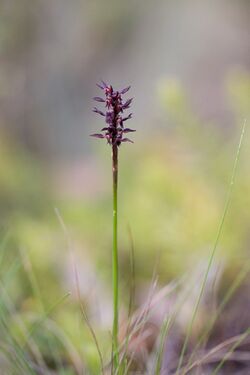Biology:Genoplesium arrectum
| Erect midge orchid | |
|---|---|

| |
| In the Namadgi National Park | |
| Scientific classification | |
| Kingdom: | Plantae |
| Clade: | Tracheophytes |
| Clade: | Angiosperms |
| Clade: | Monocots |
| Order: | Asparagales |
| Family: | Orchidaceae |
| Subfamily: | Orchidoideae |
| Tribe: | Diurideae |
| Genus: | Genoplesium |
| Species: | G. arrectum
|
| Binomial name | |
| Genoplesium arrectum | |
| Synonyms[2] | |
| |
Genoplesium arrectum, commonly known as the erect midge orchid and as Corunastylis arrecta in Australia , is a small terrestrial orchid endemic to south-eastern Australia. It has a single thin leaf fused to the flowering stem and up to twenty small, dark purple flowers. It grows in a montane and subalpine grassland and forest in Victoria and the Australian Capital Territory.
Description
Genoplesium arrectum is a terrestrial, perennial, deciduous, herb with an underground tuber and a single thin leaf 100–180 mm (4–7 in) long and fused to the flowering stem with the free part 10–15 mm (0.4–0.6 in) long. Between three and twenty dark purple flowers are crowded along a flowering stem 20–35 mm (0.8–1 in) tall and taller than the leaf. The flowers are about 6 mm (0.2 in) long, 3 mm (0.1 in) wide and are inverted so that the labellum is above the column rather than below it. The dorsal sepal is a broad egg shape, about 4 mm (0.2 in) long and 2.5 mm (0.1 in) wide with hairless edges and dark coloured bands. The lateral sepals are linear to lance-shaped, about 5 mm (0.2 in) long, 1 mm (0.04 in) wide, stiffly erect and more or less parallel to each other. The petals are a narrow egg shape, about 3.5 mm (0.1 in) long and 1 mm (0.04 in) wide with dark coloured bands and hairless edges. The labellum is elliptic to broadly egg-shaped, about 3 mm (0.1 in) long, 2 mm (0.08 in) wide, thick and fleshy with coarse hairs on its edges. There is an narrow egg-shaped callus in the centre of the labellum and extending three-quarters of the way to its tip. Flowering occurs in December and January.[3][4]
Taxonomy and naming
Genoplesium arrectum was first formally described in 1991 by David Jones from a specimen collected near Omeo and the description was published in Australian Orchid Research.[1][5] In 2002 Jones and Mark Clements changed the name to Corunastylis arrecta.[6] The specific epithet (arrecta) is a Latin word meaning "upright",[7] referring to the stiffly erect lateral sepals.[5]
Distribution and habitat
Genoplesium arrectum grows in grassland and grassy forest at altitudes above 900 m (3,000 ft) in north-eastern Victoria and in the Australian Capital Territory.[3][4]
References
- ↑ 1.0 1.1 "Genoplesium arrectum". APNI. https://id.biodiversity.org.au/instance/apni/551687. Retrieved 26 January 2018.
- ↑ "Genoplesium arrecta". World Checklist of Selected Plant Families (WCSP). Royal Botanic Gardens, Kew. http://wcsp.science.kew.org/namedetail.do?name_id=89160.
- ↑ 3.0 3.1 Jones, David L. (2006). A complete guide to native orchids of Australia including the island territories. Frenchs Forest, N.S.W.: New Holland. p. 179. ISBN 1877069124.
- ↑ 4.0 4.1 Jeanes, Jeff. "Corunastylis arrecta". Royal Botanic Gardens Victoria. https://vicflora.rbg.vic.gov.au/flora/taxon/ea7ebc4b-6e7b-43c9-84ed-2372766c3b35. Retrieved 26 January 2018.
- ↑ 5.0 5.1 Jones, David L. (1991). "New taxa of Australian Orchidaceae". Australian Orchid Research: 66–67.
- ↑ "Corunastylis arrecta". APNI. https://id.biodiversity.org.au/instance/apni/581126. Retrieved 26 January 2018.
- ↑ Brown, Roland Wilbur (1956). The Composition of Scientific Words. Washington, D.C.: Smithsonian Institution Press. p. 307.
External links
Wikidata ☰ Q15462876 entry
 |

